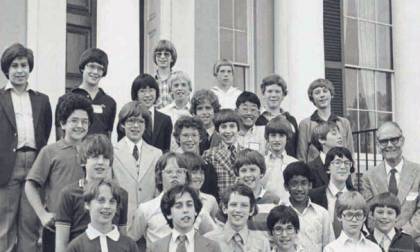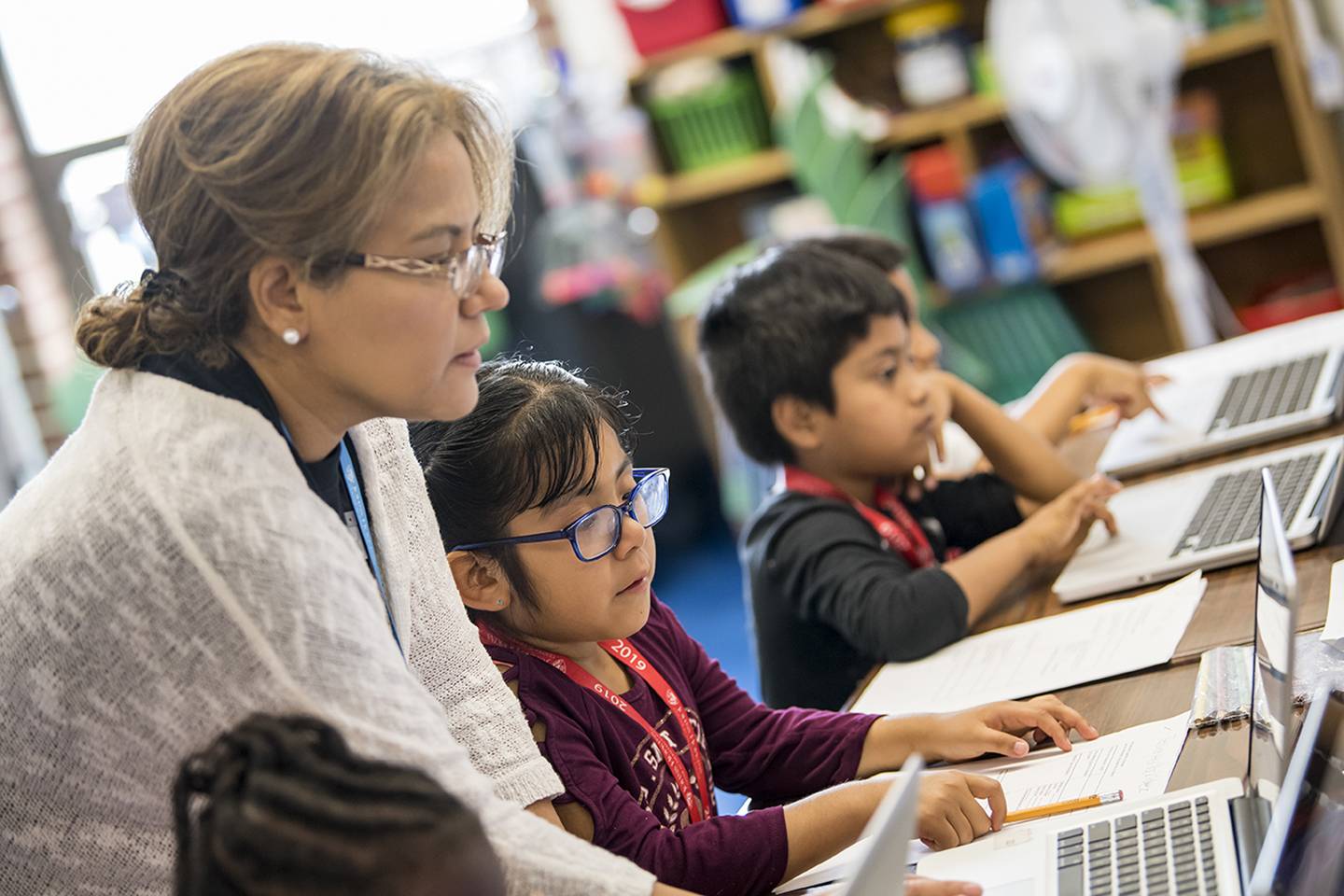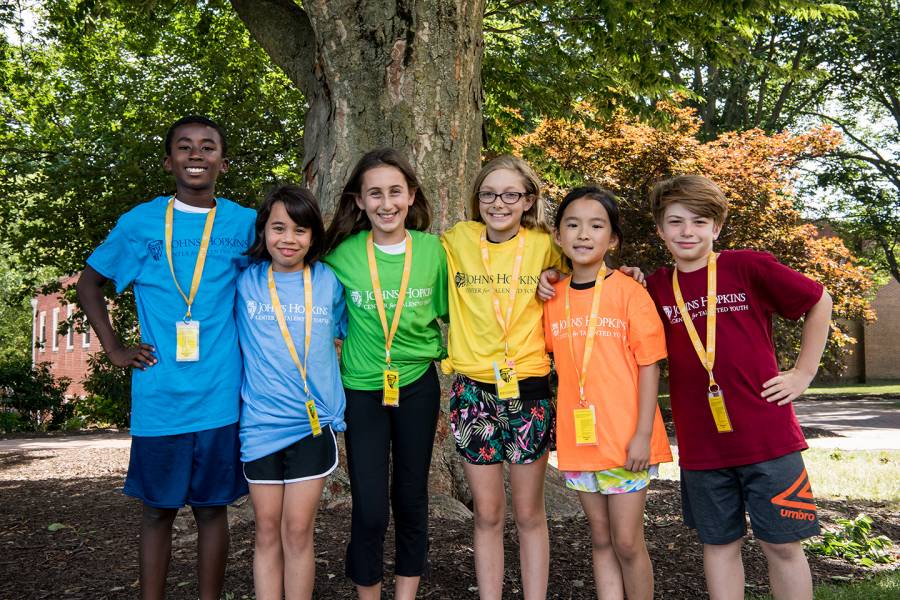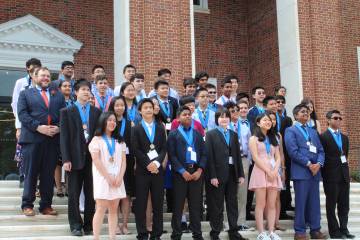In 1979, Johns Hopkins University debuted a program dedicated to identifying academically advanced seventh graders from the mid-Atlantic and offering them accelerated coursework on Saturdays and in the summer. That first year, three part-time staff members ran the program.
Forty years later, the Johns Hopkins Center for Talented Youth reaches tens of thousands of bright students each year through its Talent Search and summer, online, and family programs. Its 1.5 million alumni from around the world include the founders of Facebook and Google, as well as Rhodes Scholars and MacArthur Fellows, Nobel Prize–winner Adam Riess, Grammy winner Lady Gaga, Pulitzer Prize–winner Ronan Farrow, Fields Medalist Terence Tao, and presidential candidate Andrew Yang.
Staff marked the center's 40th anniversary last week with a celebration featuring special guests, a student panel, and a look at how CTY plans to continue shaping the field of gifted education for decades to come. The gathering was part a yearlong effort to connect CTYers around the world to observe the center's anniversary. Dozens of alumni have joined in CTY's 40 for 40 campaign throughout 2019 by hosting CTY meetups, including a recent tour of LinkedIn's Chicago headquarters and a "Canon Karaoke" at a Manhattan bar featuring classic CTY songs. Alums can still sign up to host their own 40 for 40 event.
At the event, Johns Hopkins Provost Sunil Kumar lauded CTY as an organization that values innovation and intelligent risk-taking.
"Today we should be celebrating [CTY's late founder] Julian Stanley—and looking for the next one," Kumar said.
Humble beginnings
Johns Hopkins psychologist Julian C. Stanley started laying the groundwork for CTY in 1969 after meeting Joe Bates, a 13-year-old from Baltimore who had advanced through his school math curriculum so rapidly that his teacher turned to Stanley for advice on how to proceed. Stanley started working with Bates in JHU's Ames Hall, giving him tests and puzzles to satisfy his intellectual curiosity—and gauge his academic potential. One of those tests was the SAT, and Bates earned such a high score that the provost at Johns Hopkins at the time was convinced to allow him to enroll at the university as an undergraduate at age 14. Bates, who is affectionately known as "Student Zero" in CTY circles, now owns two technology companies and has held teaching and research positions at MIT and JHU.

Image caption: Julian Stanley (far right) stands with some of his early math prodigies in 1987
Image credit: Johns Hopkins University Archives
"I took physics and math and computer science courses and I loved the work," Bates said during the CTY celebration. "Hopkins was a nerdy school that had just turned co-ed... Socially, it was so much better being in an intellectual community that cared about the things I cared about."
To find more students like Bates, Stanley developed a Talent Search, and in 1979, CTY was born. Its early programs included commuter courses and expository writing courses for which students submitted their assignments by mail. In 1991, CTY established the Study of Exceptional Talent to offer educational counseling to highly advanced students. In 1994, it began offering courses online.
Stanley died in 2005 at age 87, but his legacy endures. Today, CTY offers 170 online courses year-round in a range of subjects and formats. CTY's summer programs, held at 25 sites in the U.S. and Hong Kong, are known for their academic rigor and social engagement.
CTY alum Jenn Ramsdell recalled a CTY summer writing course in which her class read John Steinbeck's novel Cannery Row and then traveled to Monterey, Calif. to experience the titular street for themselves. It was this kind of experiential learning that Ramsdell said kept her coming back to CTY for four more summers.
"You sit in school from September to May learning what people tell you to learn, and then you come to CTY and for three weeks, and you get to learn what you want," she said.

Image caption: CTY provides hands-on, advanced programming to more than 700 students in 21 city schools this year through its CTY Baltimore Emerging Scholars Program. The initiative began in 2014 and is part of a growing partnership with Baltimore City Public Schools.
Image credit: Howard Korn for Johns Hopkins University
Sawyer Ross, 12, said his CTY online courses taught him to manage his time and and provided the opportunity for him to receive honest feedback from instructors. "In my class we would have a weekly 30-minute Skype call with the teacher," he said. "In school you don't really get that one-on-one time."
Looking ahead
Initiatives to help CTY remain a world leader in gifted education over the next 40 years include plans to make Talent Search assessments available to more students through online test administration. Projects to pinpoint the best ways to communicate with students and deliver course content in a rapidly changing technological landscape are also on the horizon.
CTY will also continue building its partnerships with Baltimore City Public Schools, including through the CTY Baltimore Emerging Scholars Program, which provides hands-on, advanced programming to 700 students in 21 city schools this year.
Linda Brody, director of CTY's Study of Exceptional Talent and Diagnostic and Counseling Center and a former graduate student of Stanley's, was honored at the anniversary celebration for her important work in the field of accelerated education. She told colleagues that continued success means embracing changing times, identifying new initiatives, collaborating, and remaining passionate about the need for bright students to be academically challenged.
"Be inspired by the kids," Brody said. "The need is still great, as a new generation looks to us for answers on how to reach their children."
Posted in University News
Tagged education, center for talented youth











